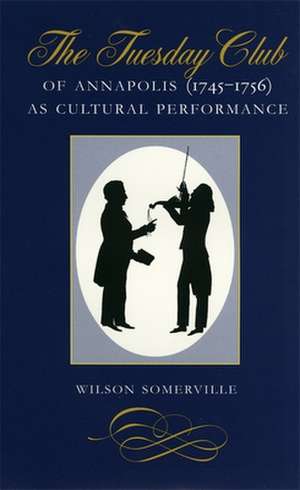Tuesday Club of Annapolis (1745-1756) as Cultural Performance
Autor Wilson Somervilleen Limba Engleză Hardback – 30 sep 1996
Preț: 365.93 lei
Nou
Puncte Express: 549
Preț estimativ în valută:
70.02€ • 73.29$ • 58.28£
70.02€ • 73.29$ • 58.28£
Carte disponibilă
Livrare economică 10-24 martie
Preluare comenzi: 021 569.72.76
Specificații
ISBN-13: 9780820318226
ISBN-10: 0820318221
Pagini: 248
Dimensiuni: 147 x 224 x 24 mm
Greutate: 0.53 kg
Ediția:New.
Editura: University of Georgia Press
ISBN-10: 0820318221
Pagini: 248
Dimensiuni: 147 x 224 x 24 mm
Greutate: 0.53 kg
Ediția:New.
Editura: University of Georgia Press
Notă biografică
Textul de pe ultima copertă
To be associated with the Tuesday Club of Annapolis was to reach the apogee of mid-eighteenth-century, upper Chesapeake male society. Founded by Dr. Alexander Hamilton, the club engaged in a range of self-conscious, stylized activities that, when viewed as "social performance", says Wilson Somerville, sharpen our understanding of the flux of cultural forces within British America and the place of such colonial groups in an emergent, transatlantic "bourgeois public sphere". Using a combination of literary, historical, and sociological approaches, Somerville first examines the aesthetic dimensions of club performance and then its social and political aspects as he places the club in five major contexts: as a group with a self-consciously dramatic deportment, as a literary guild that regulated themes and rhetorical forms, as a media station in an international network that controlled the flow of knowledge along the Atlantic rim, as an institution that defined an ideal of sociability in relation to the Chesapeake household, and as a mock state within which members wielded authority. The club, says Somerville, provided a semi-private sphere of interaction that was distinct from members' daily social order, which required their subjugation of or deference to parties ranging from their slaves to their king. Through the club, members tried to understand, negotiate, and mitigate the tensions of their lives arising from contradictions between brotherhood and empire, autonomy and sociability, the provincial and the metropolitan, the public and the private, and the solemn and the frivolous.












